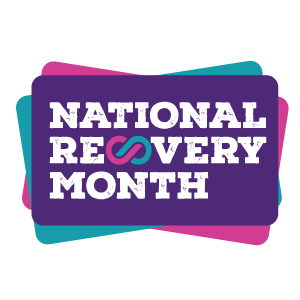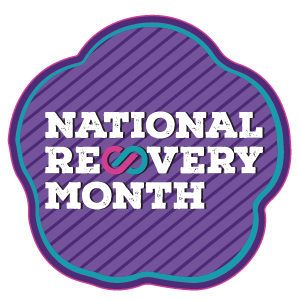National Recovery Month: Substance Use Disorder Treatment and Recovery



Each September, National Recovery Month brings national attention to the importance of mental health and substance use disorder (SUD) treatment. While recovery is a deeply personal journey, it is also a public concern — especially for those involved with the criminal legal system.
A staggering number of individuals in U.S. jails and prisons are there not because they are inherently dangerous, but because they are struggling with addiction. Drug-related arrests, untreated mental health issues and lack of access to care often lead people down a path toward incarceration instead of recovery.
In this article, we’ll explore how recovery efforts during and after incarceration can break the cycle of addiction, improve public health and support successful reentry. We’ll also highlight the critical need for trauma-informed, evidence-based care.
If you or a loved one is struggling in Washington state, don’t wait any longer to seek help. Start your recovery journey with Pioneer Human Services today.
Addiction and the Justice System: A Snapshot
Most jails do not resemble treatment centers, yet their populations reflect the country’s drug crisis. Consider the numbers below:
- In 2023, an estimated 870,874 arrests were made for drug abuse violations.
- Roughly two-thirds of people in US correctional facilities live with an SUD.
- Less than half of local facilities offer proven medications for opioid use disorder at intake.
- During the first two weeks after release, the risk of a fatal overdose can be 129 times higher than that of other state residents.
These figures highlight why recovery resources must be front and center for anyone exiting custody.
Why Recovery Support Matters After Release
Incarceration may interrupt drug use, but it rarely addresses what drives it. Without coordinated support, returning citizens often face an avalanche of triggers — old neighborhoods, relationships built on drug use, strained family ties and limited job prospects — that can lead to relapse and re-arrest.
Key risks during reentry include:
- Reduced tolerance: Even one “usual” dose can overwhelm a body that has gone months without opioids or alcohol.
- Housing instability: Couch-surfing or shelter life creates chaos that undermines recovery routines.
- Untreated trauma and mental health struggles: PTSD, depression or anxiety frequently walk hand in hand with an SUD.
- Legal and economic barriers: Suspended driver’s licenses, lapsed Medicaid coverage and hiring restrictions complicate help-seeking.
Breaking Through Barriers
Strategies that help lower overdose deaths among returning citizens include:
- Automatic Medicaid reenrollment before an individual’s release date, ensuring medication and counseling coverage on day one of reentry.
- Bridge prescriptions — such as a 30-day supply of buprenorphine, methadone or naltrexone — handed out at the gate.
- Warm handoffs to peer mentors who have walked the same path and can navigate systems.
- Clean-slate policies that seal certain nonviolent drug convictions, easing access to housing, education and employment.
What Works: Evidence-Based Care for Returning Citizens
A growing body of research spells out which services give the best odds of success. Below is a concise guide you can share with colleagues, loved ones or policy-makers:
- Medication-assisted treatment (MAT): Methadone, buprenorphine and naltrexone reduce cravings, cut overdose deaths, and make re-arrest less likely.
- Cognitive-behavioral therapy: Structured sessions help participants challenge thinking errors that fuel both substance use and criminal behavior.
- Trauma-informed counseling: Many incarcerated people carry childhood or incarceration-related trauma; addressing it lowers relapse risk.
- Peer recovery support: Certified coaches with lived experience offer 24/7 encouragement that professionals alone cannot replicate.
- Vocational training with wraparound services: Tying recovery to a paycheck reinforces self-efficacy and builds the “purpose” pillar.
Building the Four Pillars of Recovery
The Substance Abuse and Mental Health Services Administration (SAMHSA) notes that recovery flourishes across four dimensions — health, home, purpose, and community — all of which are especially critical for individuals walking out of jail or prison. SAMHSA’s framework reminds us that sobriety is much more than abstaining from drugs. To thrive, returning citizens need:
- Health: Integrated SUD and mental-health care, including MAT and therapy.
- Home: Safe, sober housing — whether permanent or transitional clean and sober housing, a structured residential reentry or halfway house, or supportive apartment building.
- Purpose: Gainful employment, education, or volunteer work that restores dignity and routine.
- Community: Faith groups, 12-step meetings, cultural circles or sports leagues that replace isolation with belonging.
How You Can Help
You do not need a clinical license to make a difference. Here are concrete actions businesses, neighbors and policymakers can take:
- Employ second-chance talent: Removing blanket “felony” boxes widens the workforce while boosting public safety.
- Donate strategically: Transportation vouchers, prepaid phones, and Narcan kits fill gaps most grants overlook.
- Advocate locally: Urge county jails to provide MAT behind the walls and auto-reenroll people in Medicaid 30 days pre-release.
- Educate your network: Use National Recovery Month graphics on social media to normalize treatment and celebrate success stories.
Find Evidence-Based, Trauma-Informed Treatment at Pioneer Human Services
Based in Washington state, Pioneer Human Services (PHS) has spent decades guiding people through both reentry and recovery. Our treatment programs feature:
- Compassionate care: Our team of dedicated professionals — many of whom have lived experience in recovery — are passionate about helping you overcome addiction and reclaim your life.
- An evidence-based approach: We utilize proven therapeutic techniques and treatment modalities that have been shown to be effective in helping individuals achieve long-term recovery.
- A supportive environment: Our welcoming and non-judgmental environment fosters a sense of community and belonging, empowering you to make positive changes in your life.
Our approach embodies National Recovery Month’s spirit, helping returning citizens reclaim health, rebuild purpose and reconnect with their community. If you or someone you love is ready for the next step, contact us today.
PHS empowers justice-involved individuals to overcome adversity and reach their full potential. With over 35 programs across the state of Washington, we’re working to eradicate mass incarceration through innovative programs and social entrepreneurship. Support our work today, and help us provide counseling, career services, housing, and — most importantly — hope.
